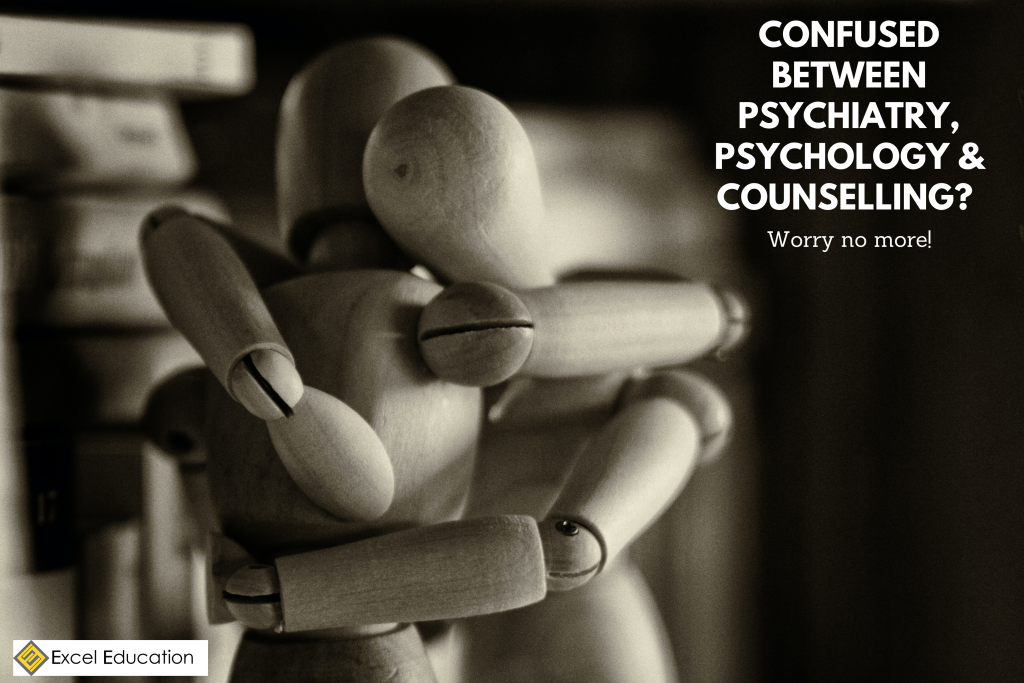
Psychologist, psychiatrist, and counsellor they all sound the same but are they different? Often, many people confuse themselves with these similar terms, assuming they are the same thing. However, they are various professions that strive for the same outcome, which is advocating for mental health and improving people’s lives.
While all professions might have several similarities, they still have a vast difference when working.
In this article, we are about to shine a light on the difference between a psychologist, psychiatrist and a counsellor which could help you determine your career path and the field that might suit you the best according to your preference.
What do a psychologist, psychiatrist and a counsellor do?
Psychiatrist: A psychiatrist is a licensed medical doctor who has gone through medical training before becoming a psychiatrist. They are the only one with the authority to prescribe medication. Psychiatrist tends to study in-depth about human behaviours and psychology; in practice, they diagnose and treat psychological and emotional disorders.
Examples of situations when a psychiatrist can prescribe medication if you’re suffering from:
Trauma and stressor-related disorder: These psychiatric disorders develop during or after stressful or traumatic life events.
Anxiety disorders: Anxiety involves focusing on the wrong or dangerous things that could happen and worrying excessively about them.
Psychologist: On the other hand, psychologists are trained professionals who assist with various mental disorders. Psychologists apply scientifically validated procedures to help people develop healthier and more effective habits. They often use psychotherapy to help treat challenges and symptoms associated with mental health and emotional conditions by helping them understand their repressed feelings, equipping them to face new life challenges.
Examples of psychological disorders are:
Autism Spectrum Disorder: This disorder is characterized by persistent deficits in social interaction and communication in multiple life areas and portrays restricted and repetitive patterns of behaviours
Communication Disorders: Disorder that impacts the ability to use, understand or detect language and speech.
Counsellor: Counsellors are usually patience and good listeners. They help their clients overcome their problems by assisting them in understanding themselves better and finding a way to cope with the issues they are currently facing. Counsellors generally assist clients that are facing problems that can be resolved with short term treatment.
Example of issues that one usually goes to see a counsellor:
Grieving: Going through a significant loss can be a long and painful process, especially when one does not have anyone to share the emotional burden.
When you’re clueless on where to start: Counselling can help one untangle and understand better sticky interpersonal situations we often find ourselves stuck.
Where do psychologists, psychiatrists, and counsellors often work?
Psychiatrist: A psychiatrist can work in different environments such as hospitals or private practice; their careers primarily revolve around the medical field due to their medical degree.
Psychologist: In contrast, a psychologist can specialize in various fields, providing them with a broader range of career opportunities. Some of them might even have their private practice and often set their working hours. Aside from only focusing on mental health, they can also specialize in other areas such as industrial-organizational psychologists where they focus on employees’ behaviour at the workplace.
Counsellor: However, a counsellor is seen working with NGO, community centres, schools, and universities. They can be seen working at hospitals assuming the role of a family grief counsellor to provide mental health evaluations or at a residential care facility which offers counselling services to people living in a temporary environment that requires continuous supervision. This may include facilities that house troubled or at-risk youths, autistic children, or people with mental or physical disabilities.
What are the key skills needed to become a psychologist, psychiatrist or a counsellor?
Psychologist:
- Patience
- Good research skills
- Excellent communications skills
- Ability to relate and empathize with a range of people
Psychiatrist:
- Empathy & compassion
- Emotional resilience
- Integrity
- Critical thinking
Counsellor:
- Emotional stability
- Open-minded
- Problem-solving skills
- Observational
How to become a psychologist, psychiatrist or a counsellor?
Psychiatrist
A psychiatrist career begins by pursuing a medical degree that takes about 5 to 6 years to complete, two years of housemanship, and four more years of completing their masters in psychiatry to become a professional psychiatrist.
|
Programme |
Requirement |
|
Bachelor in Medicine |
|
|
Masters in Medicine (Psychiatry) |
|
Psychology/Therapist
To be qualified as a psychologist, one has to start with a degree in psychology which roughly takes three years and another two to three years pursuing postgraduate studies to become a certified psychologist.
Programme | Requirement |
Bachelor Degree |
|
Masters of Clinical Psychology |
|
*Hint: An interview session will be conducted for those planning to pursue their masters in clinical psychology; no work experience is required. However, having prior work experience or an internship related to psychology could reflect well on the candidate.
Counsellor
While to become a counsellor, one has to sign up for a degree in counselling for three years followed by postgraduate studies in counselling. To become a certified counsellor, after completing their studies, they would be verified by the Malaysian Board of Counsellors.
Programme | Requirement |
Bachelor of Counselling |
|
Masters of Counselling |
|
Which are the Top Universities to study Psychology?
1. Help University

Programme | Bachelors of Psychology (Hons) | Master of Clinical Psychology |
Duration | 3 years | 2 years |
Intakes | January, May, August | January, May, Sept |
Indicative Fees (2021) | Malaysian & International Students: RM RM63, 400 | Malaysian Students:RM 48,890 International Students: RM 49,600 |
2. UCSI University

Programme | Bachelors of Psychology (Hons) | Master of Clinical Psychology |
Duration | 3 years | 2 years |
Intakes | January, May, August | January |
Indicative Fees (2021) | Malaysian & International Students: RM 73, 700 | Malaysian & International Students: RM 56, 900 |
Top University to study Psychiatry
1. Taylors University

Programme | Bachelors of Medicine, Bachelor of Surgery (MBSS) |
Duration | 5 years |
Intakes | January, March, August |
Indicative Fees (2021) | Malaysian students: RM 314, 360 International students: USD 106, 695 |
2. Mahsa University

Programme | Bachelors of Medicine, Bachelor of Surgery (MBSS) |
Duration | 5 years |
Intakes | January, March, August |
Indicative Fees (2021) | Malaysian & International Students: RM 435,300 |
Top Universities to Study Counselling
1. Help University

Programme | Master of Counselling |
Duration | 2 years |
Intakes | January |
Indicative Fees (2021) | Malaysian & International Students: RM: 41, 100 |
2. International Medical University (IMU)

Programme | Master of Counselling |
Duration | 2 years |
Intakes | September |
Indicative Fees (2021) | Malaysian students: RM55,000 International students: RM60,500 |
Articles you might be interested in:
About the Author

Rebecca Visvanathan
Caffeine addict thats constantly on the run!

